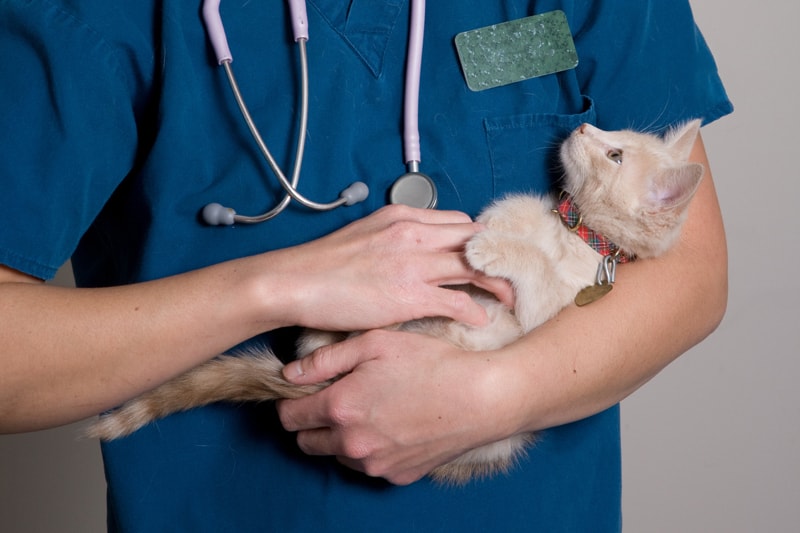How to Help a Dog with Separation Anxiety
Separation anxiety can be stressful for your dog and you. Learn 10 strategies that can help.
While begging for people food is a trait mostly attributed to dogs, it’s important to know that cats, even if they don’t beg, can be interested in your food and that some foods are bad for our kitties. Just like their canine counterparts, our cats can encounter some pretty serious consequences if they eat certain foods that are meant only for human consumption.
If you’re familiar with foods that are bad for pups, you’ll notice some overlap. That said, some foods that are bad for cats might come as a surprise to pet parents. While certainly not exhaustive, this list offers a few of the more common foods that you should keep away from your feline friends:
For a more exhaustive list of foods and other items that are hazards to our pets, check out our list of 101 Household Pet Dangers.
Here’s a breakdown of why these foods should be avoided:
1. Raw fish and meat - At first this may seem a little odd (cats love fish, right?), but it shouldn’t be a surprise. Raw meat and fish contain bacteria that can cause food poisoning. Likewise, an enzyme found in raw fish destroys thiamine, an essential B vitamin. A reduction in thiamine can lead to neurological issues, coma, and convulsions.
2. Onions and garlic - Onions of any kind can cause your kitty to become anemic by breaking down the red blood cells. Garlic can also cause your kitty to experience some gastrointestinal distress. Ingesting large quantities or regular consumption can cause serious health issues.
3. Uncooked eggs - Just like with humans, consuming raw eggs puts your cat at risk of salmonella, E.coli, and other forms of bacteria. That’s not all, though. A protein called avidin, found in the egg whites, can disrupt your kitty’s ability to absorb biotin, a B vitamin.
4. Bones - While they won’t necessarily poison your kitty, they can cause harm. For one, your cat can choke on a bone pretty easily. Secondly, bones can splinter or shatter and get stuck in your kitty’s throat or cause lacerations in their digestive system.
5. Alcohol - Keep your cat away from the kitty cocktail. Alcohol is a big no-no. Just like in humans, alcohol can have an intoxicating effect on our feline friends. Alcohol consumption can cause severe liver and brain damage. And as little as a tablespoon can put a cat into a coma and even be fatal.
6. Fat trimmings - It might seem like a few pieces of fat left on your plate from dinner would be a good treat for your cat. Think again. Fat trimmings can cause your kitty to experience an upset stomach, vomiting, diarrhea, or, worse yet, they can develop pancreatitis.
7. Caffeinated beverages - This means coffee, tea, and energy drinks – just to name a few. Not unlike their pet parents, cats who consume caffeine can experience restlessness, rapid breathing, heart palpitations, agitation, and even muscle spasms.
8. Milk and other dairy products - Didn’t see this one coming, did you? The truth is this: most adult cats are lactose intolerant and can’t digest dairy foods. If your cat digests milk or another dairy product, it could result in diarrhea and vomiting.
9. Dog food - Although dog and cat food may look similar and even have many of the same ingredients, they are not suitable substitutes for each other. Because felines and canines are different species, they require varied nutrients. If a cat were to eat a substantial amount of dog food, they could become extremely malnourished.
10. Chocolate - Chocolate (all varieties) contains theobromine and, if consumed by your kitty, it can cause heart arrhythmias, muscle tremors, seizures, and death. If that’s not scary enough, chocolate also contains caffeine, another no-no for kitty consumption.
Again, this is not a complete list, but it does cover some of the common food dangers for your kitty.

In a perfect world, pet parents would never have to deal with a pet emergency. Unfortunately, accidents, like poisonings, happen and it’s important to know what to do, so you can act quickly and effectively.
If you suspect your kitty comrade consumed something they shouldn’t have, it’s best to remain calm, so you can think clearly and make smart decisions. First, you should contact either your veterinarian or the ASPCA Animal Poison Control Center (ASPCA APCC). The ASPCA APCC can be reached 24/7 by calling 888-426-4435. A consultation fee may apply.
In most cases, it’s probably a good idea to take your kitty to your veterinarian for an evaluation. If possible, bring the product or the packaging with you to the veterinarian’s office, so the medical staff knows exactly what they’re addressing.
Need help finding a veterinarian near you? Try our handy Vet Finder!
This may sound easier said than done since cats are able to get into anything, but keeping human food out of paw’s reach and in proper storage containers is a good place to start to avoid accidental poisonings. Give your kitchen and any place you keep potentially harmful materials a good pet-proofing.
Whether it’s an emergency visit or a routine check-up, an ASPCA Pet Health Insurance plan helps you provide the care they need without breaking the bank. Interested in purchasing a plan? Get a free quote now!
The information presented in this article is for educational and informational purposes only and does not constitute or substitute for the advice of your veterinarian.
(opens new window)